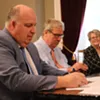A sizable group of Vermont superintendents and school board members spent their weekends writing to lawmakers, urging them to vote “no” on a sweeping education reform bill that will come before the full legislature on Monday.
H.454 aims to create fewer, larger school districts and a new system for funding schools in which the state, rather than local voters, decides how much money each district gets. Changes to both school governance and funding would be implemented starting in July 2028.
But educational leaders from some of the most populous school districts in the state say that the bill is being rushed through, fails to address the real cost drivers in education and does not reflect the wishes of most Vermonters. Several took aim at the Senate members of the conference committee — a group of six legislators who spent last week hashing out the finer points of the legislation. They asserted that the senators spent too much time fighting to protect the interests of independent schools, which only serve about 5 percent of publicly funded Vermont students.
Much of the conference committee’s negotiations last week were focused on how independent schools would fare under the legislation. Under the agreed-upon version of the bill, independent schools can charge towns 5 percent more tuition — if certain conditions are met — for students who attend using taxpayer dollars than the new “foundation formula” would provide.
Lawmakers Reach Deal on Education Reform Bill

Lawmakers Reach Deal on Education Reform Bill
By Kevin McCallum
News
Winooski superintendent Wilmer Chavarria and school board president Robert Millar released a statement on Friday night, just hours after House and Senate conferees shook hands on a deal, blasting Senate leadership for appointing committee members with”serious conflicts of interests” who “are openly and aggressively representing the interests of of private schools.”
One of the committee members, Sen. Seth Bongartz (D-Bennington), served as chair of the board of Manchester’s Burr and Burton Academy for 15 years. Another, Sen. Scott Beck (R-St. Johnsbury), is a teacher at St. Johnsbury Academy.
“Based on our observations of the Committee’s meetings this week,” Chavarria and Millar wrote, “we can say with confidence that the future of our public schools has been successfully held hostage by a private minority, with the Senate being its bullhorn.”
The superintendent and board members in Windsor Southeast Supervisory Union also wrote to legislators, saying that the conference committee’s process “has deeply undermined public trust.”
The influence of Bongartz and Beck “is evident in the final bill that safeguards private institutions while implementing sweeping and untested changes to our public systems,” superintendent Christine Bourne and four board members wrote.
Both the superintendent and school board chair of Champlain Valley School District, the largest in the state, also urged their representatives to reject the bill.
“H.454 has been rushed from the beginning,” wrote Megan Metzler, the school board chair. “Throughout the year, the bill has been amended repeatedly — often to serve interests that do not align with what’s best for students. This is not how we support our kids — whether they are in CVSD or in more rural, less affluent areas of our state.”
Champlain Valley superintendent Adam Bunting wrote that while bill may have “great intentions,” it is “marred by flaws that will unintentionally disrupt our school systems, reducing resources for our students, educators and taxpayers alike without achieving the desired outcomes.”
In Essex Westford, the second-largest district in the state, board chair Robert Carpenter and superintendent Beth Cobb wrote to legislators that they were grateful for the effort made by House members in crafting the bill but dismayed by the “reactive, last-minute amendments in the Senate,” which they chalked up to poor leadership.
In Burlington, superintendent Tom Flanagan wrote to his legislative delegation that the latest version of H.454 would not “achieve equity, affordability, and quality,” and is a product of “political maneuvering that protects and preserves inequities.”
The Vermont-NEA, the teacher’s union that represents 13,000 educators in the state, also came out against the bill on Sunday. In a message to its members, the union wrote that the bill “consolidates power in the hands of Montpelier bureaucrats; it establishes a funding formula that even the Senate conferees admit isn’t enough to educate high school students; and it continues to make carve-outs for private schools eligible for public vouchers.”
Senate Passes Education Reform Bill After Days of Political Wrangling

Senate Passes Education Reform Bill After Days of Political Wrangling
By Alison Novak
Education
Vermont School Workers United, another new educator advocacy group, also spoke out against H.454 and urged its members and community allies to rally on the Statehouse lawn on Monday at noon and 4 p.m.
It’s unclear how many legislators will heed the calls of superintendents, school board members and educators. In order to pass, the bill needs a simple majority of support in both the Senate and the House.
In a post Saturday on Front Porch Forum, Rep. Daisy Berbeco (D-Winooski), said she would not support the bill. Two senators, Martine Gulick (D-Chittenden-Central) and Tanya Vyhovsky (P/D-Chittenden-Central) said on Sunday that they would also vote “no.”
In an interview, Gulick said that she likes certain aspects of the bill, such as class-size minimums and its tax provisions. But she said other parts, particularly those pertaining to independent schools, are problematic.
“I think public schools are feeling very much like second-class citizens in this landscape,” Gulick said. “I will be a solid ‘no’ until we figure out how to do this right and what our mission and vision is as a state.”

